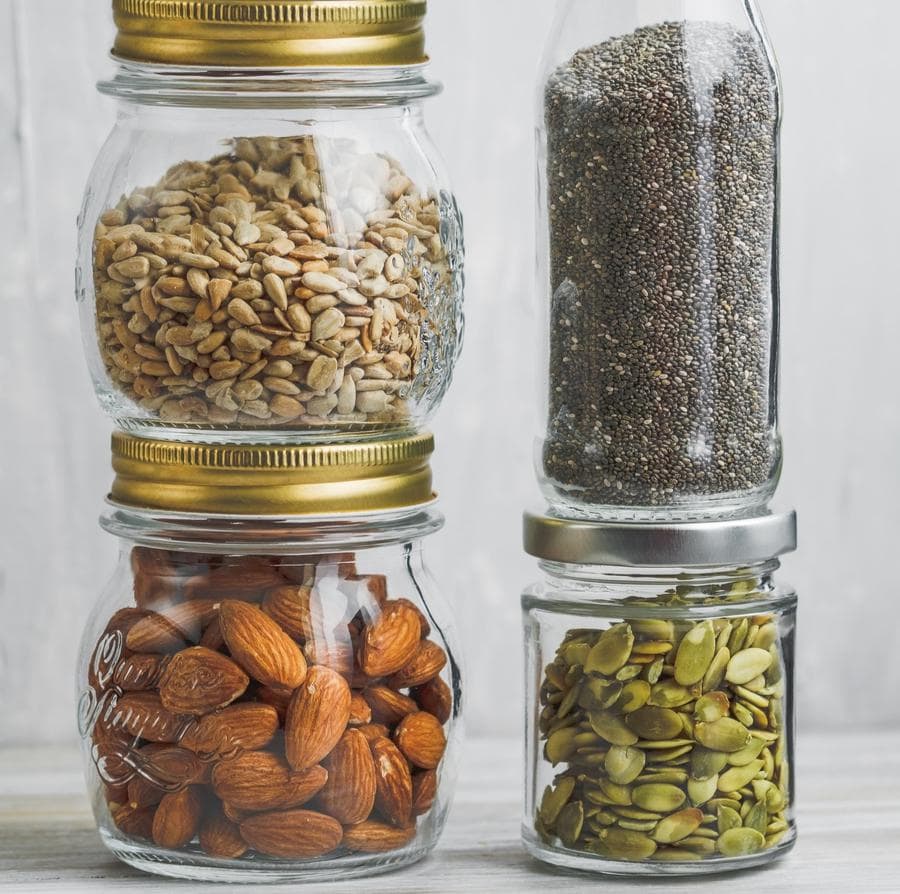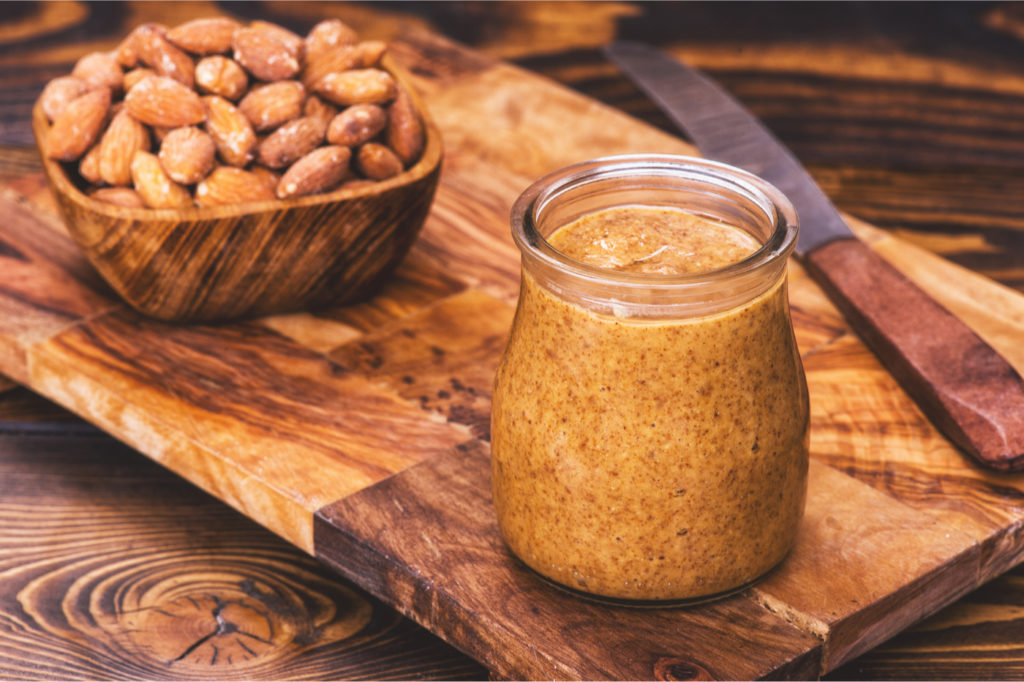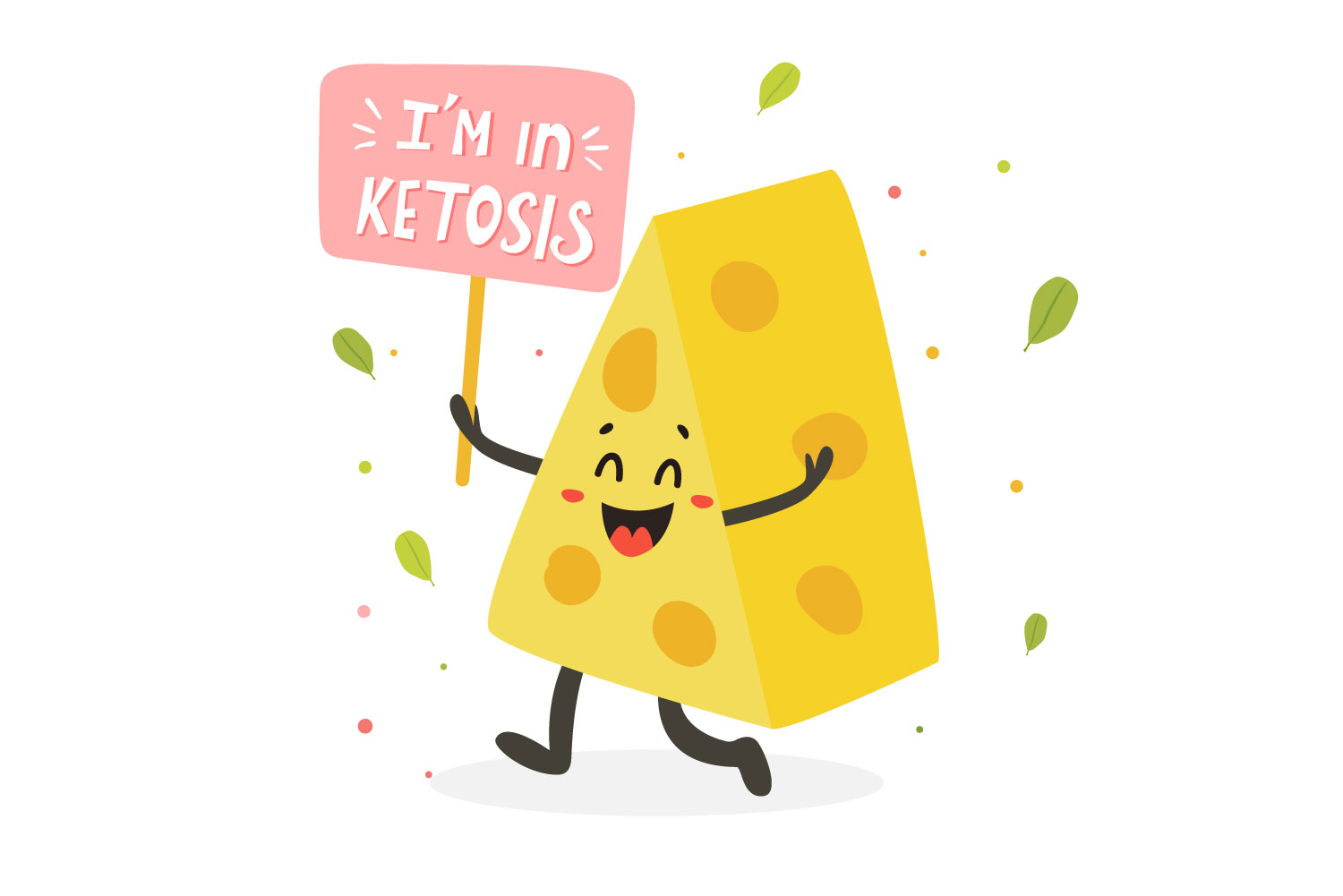SUMMARY
Almonds have what it takes to support your wellness and well-being. Rich in healthy fats and nutrients such as magnesium, this food helps you maintain an optimal weight, and it can help lower cholesterol.
Table of Contents
A few basics
Types of almonds
How to eat almonds
How to store
Nutrition facts
Health benefits
FAQs
Almond recipes
Next steps
Food is a powerful tool that can be used to maintain and improve your health.
Almonds are one of the healthiest foods on the planet, rich in nutrients that can help your body maintain wellness and fight off disease. The health benefits of almonds include an ability to lower cholesterol; this food may also lower blood pressure and bring reduced risk of cancer and heart disease.
Ready to learn more? This article will:
- Explain what almonds are, and tell you where they are grown
- Discuss the various almond varieties
- Talk about the varying ways in which these nuts are consumed, and tell you how to store them
- Give you a nutritional breakdown regarding this plant-based food
- Share ways in which this menu item benefits your health
- Answer some frequently asked questions regarding this plant-based snack
- Provide you with delicious recipes that allow you to create almond dishes that are tasty and nutritious
A few basics

Though it’s usually referred to as a nut, the almond (scientific name: Prunus dulcis) is actually a seed. This gluten-free, low-glycemic food is the edible seed of the almond tree, which is native to Iran and surrounding regions.
So, where are almonds grown?
Even though the tree’s natural habitat is in the Middle East, most of the world’s almonds come from the United States. Within that country, California is the state with the largest output. A whopping 82 percent of all almonds produced globally are grown in California.
Spain, Iran, Morocco, Turkey and Italy are also top producers.
Types of almonds
Broadly speaking, there are two main types of almonds: bitter and sweet.
Bitter almonds

The bitter almond isn’t eaten as a whole food. When raw, this nut has trace amounts of prussic acid – also known as hydrocyanic acid. This acid is essentially an organic form of cyanide, the deadly toxin. Eating just a handful of these nuts can cause breathing difficulties. This food can also shut down your nervous system, and it can be lethal in certain amounts.
Cooking eliminates this toxicity. Still, the sale of unrefined bitter almonds is banned in the U.S.
These nuts are available in Europe and other countries across the globe. Pharmacies in Germany sell them; in that country, they are a cherished ingredient in Christmas fruitcake.
Though bitter almonds aren’t sold to consumers as whole foods in the U.S., they’re used to make extract, as well as flavored liqueurs such as Amaretto. When they’ve been processed in this way, it removes the toxic prussic acid.
Sweet almonds

All the almonds that you see for sale in your local grocery store are of the sweet variety.
Sweet almonds come in many different types. Often, different regions specialize in growing specific varieties. For example, Marcona and Valencia almonds are typically grown in Spain. Almond growers in California produce more than 25 different varieties of this tree nut.
Here are some other types of sweet almonds:
- Ferragnes
- Planeta
- Llargueta
- Rumbeta
- Doble Fina
- Desmayo
- Tuono
- Cristomorto
- Ferraduel
- Sultana
- Ferralise
- Ferrastar
- Filippo Ceo
- Genco
- Fragiulio
- Rachele
- Romana
- Cavaliera
- Nonpareil
- IXL
- Ne Plus Ultra
- Texas
- Davey
- Tardy Nonpareil
- Thompson
- Ballico
- Merced
- Ruby Carmel
- Butte
- Price
These nuts are contained in a shell or skin. A key difference that separates the various types concerns the hardness of the shell. Some varieties have softer shells, while others have shells that are relatively hard.
How to eat almonds

This versatile, plant-based food can be consumed in many different ways:
Eat raw by the handful with the shell intact
This nut makes a great, filling snack, all on its own. The shells are a rich source of nutrition.
Remove the shell by blanching
To blanch, soak in boiling water. This loosens the skin and makes it easier to remove.
Blanching alters the taste and texture of this food, and makes it a better fit for some recipes. With the skin intact, almonds have more of a toasty flavor. This flavor diminishes when the skin is removed.
Grind shelled almonds to create flour
Almond flour makes a healthier substitute for white flour when baking. Unlike white flour, almond flour is a low-carb food that won’t spike your blood sugar. Use this ingredient to create wonderful dishes such as almond flour pancakes.
Process unpeeled nuts into almond meal for use in cooking
Relative to almond flour, the meal has a darker color and denser texture.
Soak and process to create a delicious almond milk

This milk is just as creamy as dairy milk, minus the cholesterol.
Toast to bring out this nut’s rich flavor when including it in bread and muffin recipes
Toasting also prevents the almonds from sinking in the batter.
Process to create almond butter
Almond butter tastes similar to peanut butter, but it has a nuttier flavor. This rich nut butter tastes great on bread or crackers, and it works well as a spread for fruit and vegetables.
You can make this butter yourself with a food processor, or you can purchase it at your local supermarket.
Crush to create almond oil
This oil is used for cooking. It can also be applied directly to the skin and hair to soften and moisturize. Make it yourself, or buy it at the grocery store.
Cut into slivers, and add to your favorite dishes
Sliced almonds can be used to garnish salads. They also work well as toppings for meat dishes, vegetable dishes and desserts.
Blanch and process to create almond paste
This paste is used in pastries such as marzipan.
How to store

Here are some tips for storing:
- Packaged raw almonds will last for up to two years with the package unopened. Store in a cool, dark place.
- Unopened roasted nuts will last for about a year in an unopened package. Again, store in conditions that are cool and dark.
- After the package has been opened, store in an airtight container or sealed plastic bag with the air squeezed out. Eat within three months, and store in the refrigerator.
- Prevent these nuts from going bad prematurely by making sure they aren’t stored in humid conditions.
- Store homemade almond butter in the fridge. With the store-bought variety, check the package – some products need to be kept in the fridge, while others can be stored at room temperature.
- Keep homemade almond milk in the refrigerator. With the store-bought version, follow the storage guidance given on the package.
- Store almond paste in the refrigerator. It will generally last for up to two years.
- Almond flour can be stored at room temperature, in the fridge or in the freezer. Freezing this flour or keeping it in the fridge will extend its shelf life.
Nutrition facts

According to the United States Department of Agriculture (USDA), there are 579 calories in 100 grams of almonds. That portion is equal to a half-cup serving size, and it contains the following nutrients:
- Protein – 21.15 g
- Carbohydrates – 21.55 g
- Net carbs (total carbs minus fiber) – 9 g
- Calcium – 269 mg
- Iron – 3.71 mg
- Magnesium – 270 mg
- Phosphorus – 481 mg
- Potassium – 733 mg
- Sodium – 1 mg
- Zinc – 3.12 mg
- Copper – 1.031 mg
- Manganese – 2.179 mg
- Selenium – 4.1 µg
- Thiamin – 0.205 mg
- Riboflavin – 1.138 mg
- Niacin – 3.618 mg
- Pantothenic acid – 0.471 mg
- Vitamin B6 – 0.137 mg
- Folate – 44 µg
- Choline – 52.1 mg
- Betaine – 0.5 mg
- Beta carotene – 1 µg
- Vitamin A – 2 IU
- Lutein + zeaxanthin – 1 µg
- Vitamin E – 25.63 mg
- Saturated fatty acids – 3.802 g
- Monounsaturated fatty acids – 31.551 g
- Polyunsaturated fatty acids – 12.329 g
As you can see from the information above, the almond nut is low in saturated fat. And it’s high in healthy monounsaturated fat. All this means good things for your wellness.
Health benefits
Let’s take a look at the ways in which this superfood can benefit your health:
Health benefit #1: Almonds may help lower LDL cholesterol

Many of us know about the perils of high cholesterol. It’s a key risk factor in conditions such as heart disease. Cholesterol gets a bad rap, but not all types are dangerous.
There are two main types of cholesterol:
- LDL (low-density lipoprotein)
- HDL (high-density lipoprotein)
Most of the cholesterol found in our body is of the LDL variety. This type of cholesterol can raise your risk of heart disease and stroke. Over time, it can accumulate on the walls of your blood vessels. This can cause the vessels to narrow, preventing blood from getting to the heart. The blockage that’s created can ultimately cause angina or a heart attack.
Our bodies also produce small amounts of HDL cholesterol. Believe it or not, this type of cholesterol can actually help improve heart health and ward off cardiovascular disease. It absorbs LDL cholesterol and assists the liver in flushing it from the body.
Research shows that almonds contains good fats that may help lower your LDL cholesterol levels:
- A 2010 study fed 65 adult participants with prediabetes a diet that derived 20 percent of its calories from almonds. At the end of the 16-week study, the participants on the almond diet had experienced a clinically significant decrease in LDL cholesterol levels.
- In another study, participants were put on an eating plan that included 1.5 ounces of almonds per day, and this caused them to experience a drop in total LDL cholesterol. Notably, these nuts achieved this without lowering the levels of beneficial HDL cholesterol.
This makes this nut a heart-healthy food that can lower cholesterol. Eat at least a handful each week to help maintain satisfactory cholesterol levels.
Health benefit #2: Almonds may help prevent cancer
According to data gathered by the Centers for Disease Control and Prevention (CDC ), breast cancer is the second most common form of cancer experienced by women in the U.S. In rare cases, this disease also occurs in men.
- It’s estimated that roughly 42,170 women will die from breast cancer this year.
- This ailment is expected to take the lives of 520 men during the same time period.
Almonds and other nuts appear to offer protection. A 2015 study showed that participants who consumed high amounts of peanuts, walnuts and almonds were two to three times less likely to develop breast cancer.
Note that this protective benefit wasn’t present with low or moderate consumption of these foods.
Reduce your risk of developing breast cancer by consuming at least a serving of these nuts per day.
Health benefit #3: Almonds may help lower blood sugar levels
Diabetes and prediabetes are conditions that affect more than 100 million Americans. In 2015, diabetes was the seventh leading cause of death in this country.
People with diabetes often have high blood sugar, which is called hyperglycemia. Research indicates that almonds may help with the management of blood sugar levels.
A 2011 study tracked 20 people with type 2 diabetes:
- Participants were put on a diet that included 60 grams (2.1 ounces) of almonds per day over the course of 12 weeks.
- Those who consumed these nuts reported improvements in blood sugar levels.
Eat a couple ounces of almonds each day to help maintain healthy blood sugar levels.
Health benefit #4: Almonds may help lower high blood pressure
According to the American Heart Association (AHA), more than 100 million Americans have high blood pressure. This condition can put you at higher risk for heart attacks and strokes.
Almonds are a good source of magnesium, and this has implications regarding blood pressure:
- Magnesium deficiency has been linked with high blood pressure.
- Studies show that correcting this deficiency can help to significantly decrease a person’s blood pressure levels.
Including almonds in your diet can provide you with the magnesium you need to stave off high blood pressure.
Health benefit #5: Almonds may help with weight management

Many of us struggle with unwanted weight gain from time to time. Almonds have qualities that may help promote weight loss:
- These nuts contain lots of protein, fiber and healthy fats.
- This makeup of nutrients can leave you feeling full and reduce your appetite.
- This may ultimately cause a reduction in caloric intake, and consuming fewer calories may ultimately help you lose weight.
In one study, a mid-morning almond snack was shown to increase satiety in ways that can have a positive effect on appetite control.
This superfood may help make it easier for you to stick to a low-calorie diet. Add a moderate amount of these nuts to your diet if you’re hoping to shed a few pounds.
Health benefit #6: Almonds may help prevent oxidation of LDL cholesterol
We’ve already mentioned that almonds can help lower LDL cholesterol. But this tree nut accomplishes more than mere cholesterol reduction as it works to protect heart health.
LDL cholesterol can cause problems when it’s present in your blood. But these problems can become even more severe if this cholesterol is pummeled by oxidative stress. Oxidized LDL cholesterol is a primary cause of heart disease.
Almond skin is a good source of flavonoid antioxidants. These antioxidants work powerfully to fight harmful free radicals that can cause oxidation.
In a 2005 study, the flavonoids found in these nuts were shown to help prevent cholesterol oxidation. You can help your body ward off oxidation by regularly including them in your diet.
FAQs
Now we’ll take a look at some common questions regarding these tasty nuts:
Can dogs eat almonds?

Almonds are a healthy and nourishing food for humans. However, according to the American Kennel Club (AKC), this food isn’t so great for dogs.
Nuts in general can be very toxic for canines. Almonds are less harmful for dogs than some other nuts, but they can still cause serious problems. If your dog eats almonds, it can cause symptoms such as:
- Gas
- Vomiting
- Diarrhea
- Lethargy
- Loss of appetite
If your dog eats just an almond or two, you may not have anything to worry about. Observe your pet closely to see if the symptoms discussed above present themselves. In cases where symptoms are present or your dog has eaten more than a few nuts, call your veterinarian for guidance.

Are almonds good for weight loss?
Almonds can support you on your weight-loss journey:
- This food is high in protein and fiber.
- Protein and fiber promote a sense of fullness that can cause you to eat less.
- Also, protein works hard to help your body burn fat.
A 2014 study shows that participants who added these nuts to their diet lost more weight than those who added complex carbs.
The study also shows that participants who munched on almonds every day didn’t gain weight, even though this food added hundreds of calories to their diet. Researchers believe that eating these nuts helped participants to curb their appetite and prevented them from consuming more food with their meals.
This food is high in calories, but research indicates that not all of these calories are passed on to the body. One study suggests that the body is less efficient at digesting the fat in almonds than we’ve realized. As a result, the from these nuts isn’t completely metabolized by the body. This effectively reduces the calories provided.
If you want to lose weight in a healthy way, it’s important to make sure you’re burning slightly more calories than you’re consuming via food. Keep this in mind when deciding how many of these nuts to include in your diet each day.
Are all almonds pasteurized?
Most of the almonds sold in the U.S. are pasteurized. This includes those that are labeled as being raw.
Pasteurization is a process that’s used to kill bacteria. It can be done using steam. Alternatively, some companies pasteurize by adding a fumigant, propylene oxide; according to the CDC, this chemical has been shown to cause cancer in mice.
With organic almonds, steam pasteurization is the only method used when nuts are put through this process. However, many conventional almond growers use propylene oxide to achieve pasteurization. If you want pasteurized almonds that haven’t been treated with propylene oxide, buy organic.
Pasteurization provides certain benefits. Still, some people prefer to consume truly raw nuts that haven’t been pasteurized, and these are available online.
Nuts that haven’t undergone the pasteurization process are explicitly labelled as “unpasteurized.” Keep this in mind if you’re searching for them online
Are almonds keto?
Yes, these nuts are keto-friendly. They’re high in fat and low in carbs. Its macro breakdown makes this food a great choice those who are following a keto diet.

Almond recipes
Ready to step up your nut consumption and add some healthy fat to your diet? Here are some recipes that make the most of this nut’s rich flavor:

Butter Pecan Pancakes
This recipe creates delicious almond flour pancakes, and it includes cinnamon and crushed pecans. Top with maple syrup for a memorable treat.
Pumpkin Bread
Almond flour is great in baked goods, and that’s evident in this delicious pumpkin bread. This recipe is designed to accommodate keto and paleo diets.
Chinese Almond Chicken
Chinese almond chicken is a staple in Asian cuisine. This scrumptious recipe combines chicken, water chestnuts, snow peas and stir-fried almonds.
Almond Milk and Berry Smoothie
Craving a tasty smoothie? This one includes almond milk, frozen berries and banana chunks. You can whip it up in less than five minutes.
Creamy Vegan Almond Cheese
This spreadable vegan cheese includes blanched almonds, garlic and olive oil. It’s creamy and delicious enough to make you forget all about dairy.
Almond Flour Keto Shortbread Cookies
In the mood for cookies? These are keto-friendly, low-carb and sugar-free. This recipe includes almond flour, butter and erythritol.
Maple Pecan Muffins
This yummy recipe teams almond flour with eggs and coconut flour. It’s paleo-friendly and keto-approved.
Avocado Fries
Unlike the fast-food kind, these fries are keto-friendly. They’re also 100 percent vegan. This recipe owes its deliciousness to avocado, almond flour and flaxseed meal.
Coffee Almond Butter Chocolate Chunk Ice Cream
Looking for a creamy dessert that’s keto-approved and completely plant-based? This recipe includes almond butter and coconut milk.
Next steps
Whether you’re looking to lower cholesterol, reduce blood sugar or lose weight, nutritionists agree that almonds have beneficial properties that can support you on your journey. This food is great for snacking, and it can also be integrated into larger meals, from breakfast to dinner.
Best of all, almonds are compatible with a wide range of eating plans:
- If you’re on a keto path, these nuts help you stay in ketosis by providing healthy monounsaturated fats.
- This plant-based food also works well for vegans.
- And if you’re following a more traditional Mediterranean diet that includes choices such as avocados and olive oil, almonds are a great choice.
Fresh N Lean provides healthy meal delivery that can help you add more of these nuts to your diet in the most convenient way possible. Our meal plans include dishes such as Strawberry Almond Oatmeal and Almond-Crusted Sustainable Cod. We also offer a la carte almond snacks.
Fresh N Lean is the nation’s largest organic meal delivery service. Our tasty, chef-prepared cuisine is always fresh and never frozen, and we offer convenient meal plans like Protein+, Keto, Paleo, Standard Vegan and Mediterranean. Choose Fresh N Lean for affordable nutrition, delivered to your doorstep.




